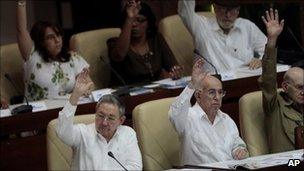Cuba National Assembly approves economic reforms
- Published

Mr Castro (L) warned that bureaucratic resistance to his reforms was useless
Cuba's National Assembly has given its backing to President Raul Castro's plans to reform the country's stagnating economy.
The reforms, ranging from the setting up of small businesses to reducing bureaucracy, had already been agreed by the ruling Communist party.
Mr Castro also hinted that changes to the country's controversial travel and emigration rules could be introduced.
He said those attempting to undermine the reforms could face prosecution.
The BBC's Michael Voss in Havana says one of the biggest obstacles Mr Castro now faces is resistance from party bureaucrats who face losing their job under the changes.
But the president warned lawmakers that "bureaucratic resistance is useless".
Mr Castro told parliament that the time had come for social and political reforms to be introduced. "Let's clean our heads of all sorts of nonsense," he said.
The move to relax travel and migration restrictions was welcomed by people in Havana
The measures the assembly was discussing in its twice-yearly session include cutting more than one million state jobs in a move to reduce Cuba's vast bureaucracy and reducing the state's role in areas such as agriculture, retail and construction.
Small private businesses will be encouraged to step in to fill the space, while state subsidies for goods and service will be phased out.
Mr Castro also said the government was "working to orchestrate the modernisation" of the country's migration policies.
Human rights groups have long criticised the requirement for Cubans to get government permission to travel abroad - a remnant of the days when Cubans emigrated for political rather than economic reasons.
Mr Castro said the rules had "played a role in their time and endured unnecessarily".